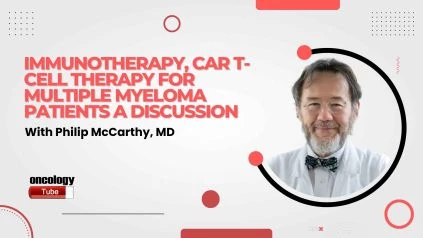Philip McCarthy, MD, from Roswell Park Cancer Institute provided an overview of CAR T-cell therapy, focusing on its application in multiple myeloma. CAR T-cell therapy involves genetically modifying T-cells to express a chimeric antigen receptor (CAR) that recognizes a specific antigen on tumor cells, such as BCMA (B-cell maturation antigen).
The therapy takes advantage of the cytotoxic potential of T-cells to kill tumor cells in an antigen-dependent manner.
The first clinical trial of CAR T-cell therapy was conducted in patients with resistant chronic lymphocytic leukemia in 2011.
Since then, the therapy has shown promise in multiple myeloma, particularly in patients who are resistant to standard chemotherapy.
CAR T-cells can persist in the body for varying periods, and the field is constantly evolving.
There are currently two commercially available CAR T-cell therapies for multiple myeloma: Ide-cel and Cita-Cel, both targeting BCMA.
These therapies can also affect normal cells expressing BCMA, leading to B-cell hyperplasia. Patients eligible for CAR T-cell therapy in multiple myeloma must have undergone prior lines of therapy and received specific treatments.
Dr. McCarthy discussed the unique toxicities associated with CAR T-cell therapy, including cytokine release syndrome (CRS), immune effector cell-associated neurologic syndrome (ICANS), and tumor lysis syndrome.
CRS is characterized by the release of various cytokines, causing fever, hypotension, and hypoxia.
ICANS involves neurotoxicity resulting from immune effector cell activation.
These toxicities can be managed with medications like Tocilizumab and steroids.
The expression of BCMA and serum BCMA levels are factors that can impact treatment outcomes.
Additionally, considerations such as lymphocyte collection, manufacturing methods (fresh or frozen), and bispecific T-cell engagers influence the effectiveness of CAR T-cell therapy.
Dr. McCarthy emphasized that CAR T-cell therapy should be considered for patients who have exhausted other treatment options.
Ongoing research is exploring alternative targets, such as Anti-GPRC5D, and the development of allogeneic CAR T-cells to overcome resistance and allow for multiple infusions.
In conclusion, CAR T-cell therapy holds promise as an innovative treatment for multiple myeloma.
Despite some unique toxicities, the therapy has demonstrated effectiveness in patients who have relapsed or become resistant to other treatments.
Ongoing research aims to improve the therapy’s efficacy and broaden its applicability beyond BCMA.

